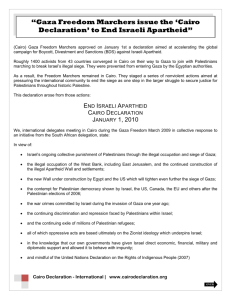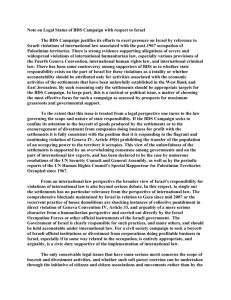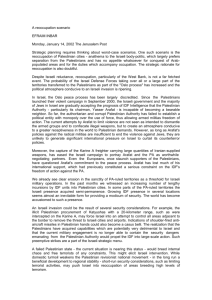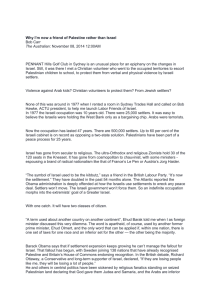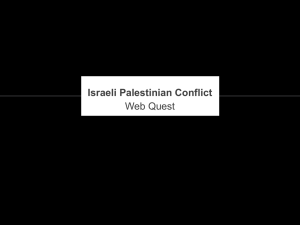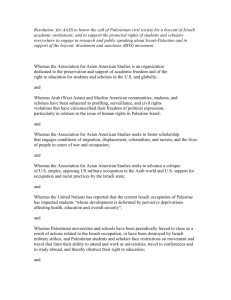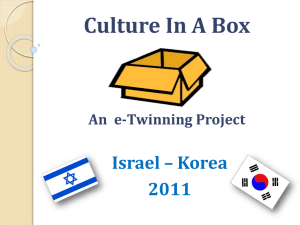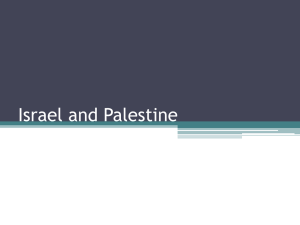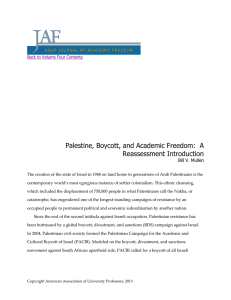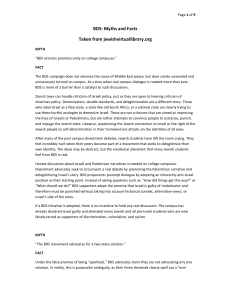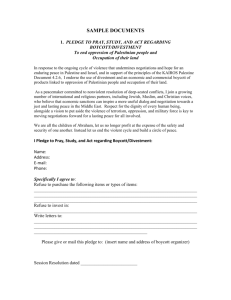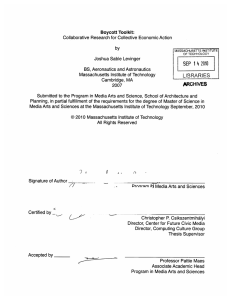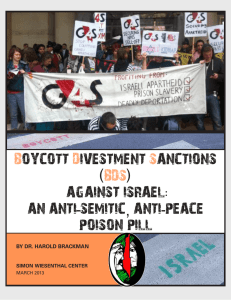boycott, divestment and sanctions for peace
advertisement
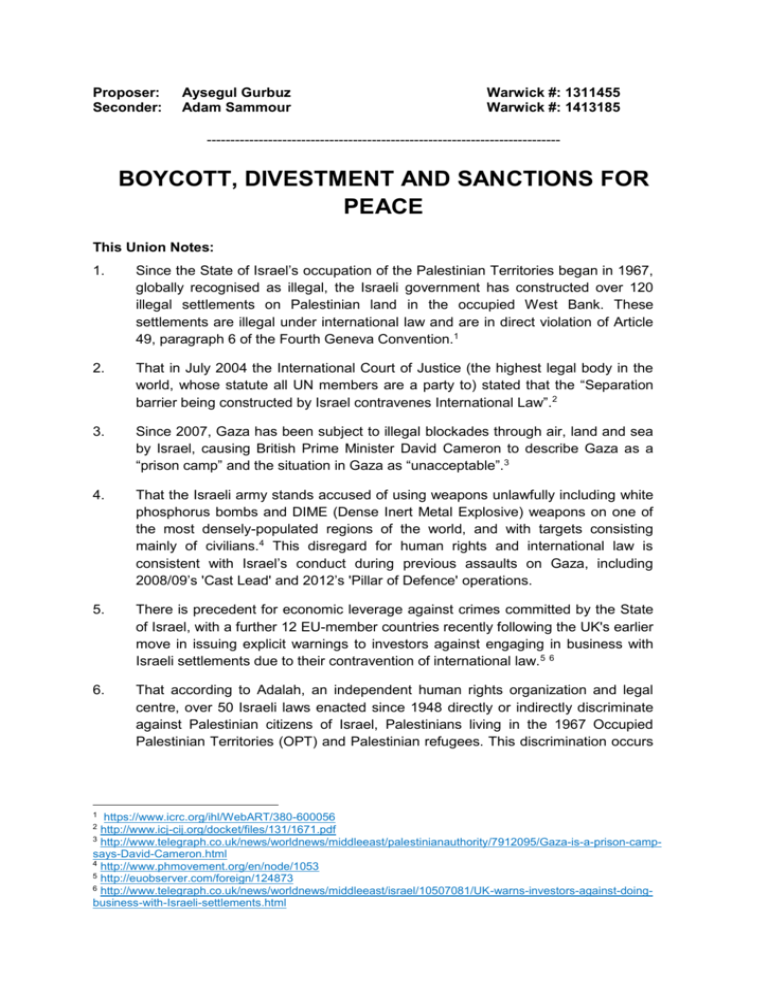
Proposer: Seconder: Aysegul Gurbuz Adam Sammour Warwick #: 1311455 Warwick #: 1413185 --------------------------------------------------------------------------- BOYCOTT, DIVESTMENT AND SANCTIONS FOR PEACE This Union Notes: 1. Since the State of Israel’s occupation of the Palestinian Territories began in 1967, globally recognised as illegal, the Israeli government has constructed over 120 illegal settlements on Palestinian land in the occupied West Bank. These settlements are illegal under international law and are in direct violation of Article 49, paragraph 6 of the Fourth Geneva Convention.1 2. That in July 2004 the International Court of Justice (the highest legal body in the world, whose statute all UN members are a party to) stated that the “Separation barrier being constructed by Israel contravenes International Law”.2 3. Since 2007, Gaza has been subject to illegal blockades through air, land and sea by Israel, causing British Prime Minister David Cameron to describe Gaza as a “prison camp” and the situation in Gaza as “unacceptable”.3 4. That the Israeli army stands accused of using weapons unlawfully including white phosphorus bombs and DIME (Dense Inert Metal Explosive) weapons on one of the most densely-populated regions of the world, and with targets consisting mainly of civilians.4 This disregard for human rights and international law is consistent with Israel’s conduct during previous assaults on Gaza, including 2008/09’s 'Cast Lead' and 2012’s 'Pillar of Defence' operations. 5. There is precedent for economic leverage against crimes committed by the State of Israel, with a further 12 EU-member countries recently following the UK's earlier move in issuing explicit warnings to investors against engaging in business with Israeli settlements due to their contravention of international law.5 6 6. That according to Adalah, an independent human rights organization and legal centre, over 50 Israeli laws enacted since 1948 directly or indirectly discriminate against Palestinian citizens of Israel, Palestinians living in the 1967 Occupied Palestinian Territories (OPT) and Palestinian refugees. This discrimination occurs 1 https://www.icrc.org/ihl/WebART/380-600056 http://www.icj-cij.org/docket/files/131/1671.pdf 3 http://www.telegraph.co.uk/news/worldnews/middleeast/palestinianauthority/7912095/Gaza-is-a-prison-campsays-David-Cameron.html 4 http://www.phmovement.org/en/node/1053 5 http://euobserver.com/foreign/124873 6 http://www.telegraph.co.uk/news/worldnews/middleeast/israel/10507081/UK-warns-investors-against-doingbusiness-with-Israeli-settlements.html 2 in all areas of life, including their rights to political participation, access to land, education, state budget resources, and criminal procedures.7 7. That an international legal team, commissioned by the Human Sciences Research Council of South Africa on behalf of the South African Department of Foreign Affairs, concluded that Israeli practices are consistent with apartheid and colonialism as agreed in relevant international legal instruments.8 8. That Veolia have sold off all of their business interests in Israel9 other than the Jerusalem Light Rail, as a result of continued pressure from the boycott movement.10 11 9. That many Israeli academic institutions have either contributed directly to the Israeli occupation and apartheid or at the very least have been complicit through their silence.12 10. That the NUS, NUS Scotland, NUS Black Students’ Campaign, Dundee University Student Association, KCLSU and other students’ unions across the UK have adopted forms of the BDS movement.1314 11. That people of all faiths and backgrounds, including Jewish and Israeli peoples, support the call to the BDS movement.15 This Union Believes: 1. That the ongoing occupation is harmful to both Israelis and Palestinians. 2. That Israeli laws such as the Absentee’s Property Law and The Citizenship and Entry into Israel Law are tantamount to apartheid.16 3. To boycott and divest is to refuse to be complicit in generating profit from the violation of Palestinian rights. 4. That to call for the implementation of sanctions against the State of Israel is to ask the global community to recognise Israel’s repeated violations of international law and to act accordingly with just measures. 5. That unions should work to support human rights for all, including both Palestinians and Israelis, and uphold international law. 7 http://www.adalah.org/en/content/view/7771 http://web.archive.org/web/20090622083122/http://www.hsrc.ac.za/Document-3227.phtml 9 http://www.veolia.com/en/veolia-group/media/press-releases/veolia-closes-sale-its-activities-israel 10 http://www.rte.ie/news/special-reports/2010/1122/294690-israel/ 11 http://electronicintifada.net/blogs/adri-nieuwhof/veolia-suffering-expensive-damage-due-palestinecampaigners-publicity-says 12 http://oneworld.org/2015/10/26/we-will-not-work-with-israels-universities-say-340-uk-academics/ 13 http://bdsmovement.net/2014/uk-black-students-conference-12105 14 http://bdsmovement.net/2014/scottish-students-say-yes-to-boycotting-israel-12032 15 https://jewishvoiceforpeace.org/boycott-divestment-and-sanctions/jvp-supports-the-bds-movement/ 16 (see reference 7) 8 6. That the BDS movement succeeded in helping to end apartheid in South Africa and has already achieved some success with regards to Israel. 7. That the BDS list is subject to continuous change. The BDS list the SU should refer to is found in the NUS BDS Student Handbook. The SU should refer to this handbook because NUS is a representative of all students and is a credible source.17 This Union Resolves: 1. To fully endorse and implement the Boycott, Divestment and Sanctions movement the best of its ability.18 2. To condemn the Israeli occupation of pre-1967 Palestinian lands, including East Jerusalem. 3. To recognise the forced removal of Palestinians and their identity from villages and other settlements during the 1948 Palestinian War and the right by international law for the Palestinian people to return to these lands.19 4. That the SU join the international academic boycott of Israeli academic institutions which support or benefit from the occupation of Palestine20, as cited by Part IV of The Economy of Occupation written by Uri Yacobi Keller and published by the Alternative Information Center, including by: (i) Advising, lobbying and voting against academic cooperation, collaboration or joint projects, including Study Abroad programmes, with Israeli institutions complicit with the occupation; (ii) Advocating for academic divestment and disinvestment from Israel by the University of Warwick; (iii) To voice support for Palestinian academic and cultural institutions; and support the BDS movement until Israel: (a) withdraws from all the lands occupied in 1967, including East Jerusalem; (b) removes all of its colonies in those lands; (c) commits to United Nations resolutions relevant to the restitution of the rights of Palestinian refugees; (d) dismantles its system of institutionalised discrimination against Palestinians, Arabs, and other ethnic minorities in Israel. 5. Not to boycott Israeli individuals and to encourage meaningful dialogue, 17 http://nusdigital.s3-eu-west1.amazonaws.com/document/documents/17435/dce7c808d30c97e0cd18df40ad90796c/2015%20NUS%20BDS %20Handbook.pdf?AWSAccessKeyId=AKIAJKEA56ZWKFU6MHNQ&Expires=1453379268&Signature=hFa5yB ABN3QndXFSRccGjysNkAM%3D 18 http://bdsmovement.net/bdsintro 19 http://www.haaretz.com/ethnic-cleansing-of-palestinians-or-democratic-israel-at-work-1.361196 20 http://www.bdsmovement.net/files/2011/02/EOO23-24-Web.pdf (p35) conferences and other academic discussions between Israelis, Palestinians and others that may foster empathy, understanding and peace. 6. To add to the Warwick SU Boycott List the companies and organisations listed in the NUS BDS Student Handbook, and any other companies or organisations identified as supporting Israel materially, economically, militarily, and/or as helping maintain the illegal Israeli settlements.21 Such organisations when brought to the attention of the SU should be reviewed by the relevant SU committees to determine whether they qualify for the boycott list. If the SU has any ongoing contracts with these companies or organisations, then the SU should not renew these upon expiry as long as there is any alternative provider of services that meets the core requirements of the SU. 7. To work with members of the University’s Finance and General Purposes Committee to identify how the University employs or works with companies or organisations identified as facilitating Israel's military capacity, human rights abuses or illegal settlement activity, and actively put pressure on the University of Warwick to cut ties with those companies or organisations. 8. To encourage the University to adopt a scholarship scheme for Palestinian students in collaboration with the British Council, similar to those currently offered at Durham and Oxford Brookes universities.22 21 22 (see reference 17) http://www.britishcouncil.ps/en/study-uk/scholarships
